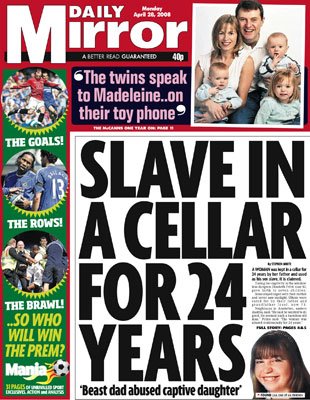

 You wait ages for more stories about Madeleine McCann to fill the empty stomachs of both newspaper editors and the few, still voracious readers that can't binge on them enough to arrive and then three come along at once.
You wait ages for more stories about Madeleine McCann to fill the empty stomachs of both newspaper editors and the few, still voracious readers that can't binge on them enough to arrive and then three come along at once.
Actually, let's just rewind for half a second. Is there really anyone still out there that isn't so sick of the sight of Madeleine, her parents and also Clarence Mitchell that they'll purposefully not buy any newspaper or watch any channel featuring yet another redundant article or pseudo-documentary on the three of them? In the Eternal Sunshine of the Spotless Mind, the idea of being able to wipe someone completely out of your memory is treated as though it would be a bad, bad thing - trying telling that for example to either the stalker, or indeed, the stalkee. I, and I suspect a large number of the population of this poor, benighted septic isle, would quite willingly pay inordinate amounts for a service which destroyed the receptacles which contain all we know about Maddie, Kate, Gerry and all in sundry. I try my best to continue to feel something approaching empathy for the couple, who despite everything that has happened, have lost a child through absolutely no fault of their own, but as the days tick by and the headlines still come, the narrative long since lost, I can't be the only one who yearns for them to just go away.
The McCanns are victims on two fronts - not just that their daughter has been taken from them, but that the media, in all its forms, has exploited them and wanted to use their every sweat and tear drop for their own purposes. The ambivalence of not knowing where to apply the blame, and blame, as always, is vital and an important part of the story, is that the McCanns themselves were the ones who were the first to use others. Their motives were impeccable, but publicity, which is what they thought might deliver their daughter back to them, also threatened to scare whoever took her into taking to ground, if "he" hadn't already disappeared for good. It was a risk worth taking, but it was also one that started the fire, one which to this day is still alight and burning just as fiercely as ever.
It seems doubtful that even they could have foreseen that the disappearance of their daughter would be used to beat every dead horse that could possibly be struck. Swarthy foreigners, paedophiles, bent and incompetent bumbling police officers, open class prejudice, down to today's most ludicrous and possibly weakest Madeleine front page splash ever, the deplorable Daily Star's "MUSLIM SICKOS' MADDIE KIDNAP SHOCK", an article which doesn't seem to have been republished online, which details "extremists" chatting amongst themselves of how the McCanns themselves might be responsible, something that the Daily Star seems outraged about purely because they had to publish a front page apology and pay the McCanns £500,000 when they did it for months on end, all have been brought in, attacked and condemned, usually without even the slightest evidence to back up their claims, the only link between them being churnalism and keeping a story going for their own purposes. Lionel Shriver, in an excellent piece, comes to a conclusion few will disagree with:
In the case of Madeleine McCann, the British media has frequently elevated the requirements of fiction over the truth. As a consequence, a grieving couple's loss of their daughter has been made even more agonising than it had to be. Indeed, this last year's over-the-top Maddy-mongering has to go down as one of British journalism's most shameful instances of cheap, cavalier opportunism - of its greater commitment to a "good story" over the accurate one.
Words that feel all the more poignant, published just a day before the Sun launches 3-days worth of what can only be described as flowery bullshit, with "Maddie: A year in the darkness". Just today, the paper is dedicating a whole 12 pages to this special in mock empathy. The emptiness of the words that open this dirge are worth quoting:
WITH one momentous sentence on May 4, 2007, the Associated Press broke one of the biggest news stories of modern times.
Almost exactly a year on, it continues to fascinate and horrify. To send chills down the spine of every parent. To turn us all into armchair detectives harbouring pet theories on what really happened.
Its complexities, moral and forensic, are still talked about in every home, office and factory, and in every newspaper.
None of us had heard of Madeleine McCann until she was already gone. But we feel we know her now.
To see pictures of the face we will never forget, click on the slideshow below
Since last May, millions of words have been written about her disappearance and the continuing torment of her parents Kate and Gerry. In three Sun specials this week, JOHN PERRY sorts the fact from the fiction in the most complete account to date.
This the very worst of journalism. In fact, let's not dignify it by calling it journalism. It isn't. It's emotional pornography, the act of someone who should know better doing the equivalent of jerking the reader off, telling him or her what they think they want to hear rather than making them employ the use of their brain for half a second. There is only one previous event that resulted in trained, well-educated individuals turning out such mawkish, sentimental nonsense, and that was the death of Princess Diana. Diana's death occurred before the full takeover of the 24-hour news cycle, before the full advent of the internet and all that has entailed for individual participation, but even then it was noted that her death resulted in it being flooded with the very worst that it encourages and provides a platform for: the conspiracy theorists, the cranks and those who can shout the loudest when they ought to just shut up.
Perhaps the Sun's front page and its special signify more about their and everyone else's response to the case than even they realise at face value. "Her harrowing story" it screams - harrowing? Really? It's harrowing purely because of the spin that they've put on it; it seems, in retrospect, as Shriver notes, almost ordinary. Little girl goes missing, her fate unknown. Harrowing for the parents maybe, but for Madeleine herself? Not necessarily. The opening paragraphs of their story give the game away even further, "to send chills down the spine of every parent"; fear sells, as the self-same newspapers ever shrieking about predatory paedophiles when children are most likely to be killed or abused by those known to them, especially their close family know all too well. We want to lock terrorists up for 42 days and plan endlessly to thwart attacks, yet being killed by a terrorist is far beyond the odds of winning the lottery, with dying from a hospital superbug, or even more likely, in a car accident, is something which is far less, well, sexy. The title itself, Madeleine: a year in the darkness works both ways: we don't know what happened to her, but then neither do those who have wrote about her; they've been literally working in the dark, shamelessly slandering anyone and everyone, all in the name of pursuing sales. It doesn't matter who's been caught in the crossfire: the ends justify the means. £500,000 from the Express, which went too far, is probably small beer off what even those two gutter rags earned from their reports. Robert Murat, another individual caught in the crossfire after a tabloid journalist, who might just have a degree in the humanities instead of psychology or anything that might have justified her turning her petty suspicions into open accusations reported him to the police, has launched his own libel action against all of the tabloids and also the Scotsman. It's hard not to think that he'll deserve every penny that he might receive.
It's not even as if today is the first year anniversary of Madeleine's disappearance: rather, it again seems that this is the media trying to outdo each other, either the Sun or the Mirror responding to each other's respective exclusives, the actual date still being 3 weeks away. The Mirror's headline is "Sometimes We Feel Like Giving Up". Excuse me if I'm wistful that either they, the newspapers, or indeed I actually did do that. Then again, maybe there is a glimmer of light in another, genuinely harrowing story, the one that broke yesterday in Austria. The Sun is already on the case, asking MySun contributors how they would punish a man not yet convicted of any crime.
To come back to Shriver again, she also writes:
Journalists have to remain committed to keeping reality intact, even if the real story is flat.
This is an almost utilitarian, noble view of what journalists are supposed to do. As this blog and countless others have noted time and again, this is simply not what the British press does. It sensationalises, it distorts, it lies, and it's done it for a very long time. Say this to them and they scream of censorship and press freedom, yet it's those very notions that the press brings upon itself by its actions. They complain of a liberal media, as does some right-wingers, of a sort of conspiracy between the BBC and the Guardian that somehow governs the country and controls what can and cannot be said. It's a hysterical fantasy, but it's a beguiling one, much like their very coverage of the Madeleine McCann case. Some thought that the libel actions against the Express would have brought an end to the rapacious, scurrilous coverage, but it hasn't. There's still newspapers to be sold and money to be made, and little things like accuracy and compassion don't enter into that. The crocodile tears will continue to be shed, and getting a grip or a perspective has long been cast out, to be shunned for evermore.Labels: abuses by tabloids, churnalism, journalism, Madeleine McCann, Madeleine McCann bullshit, media anaylsis, Scum-watch, Sun-watch







